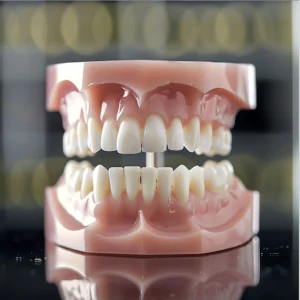Table of Contents
In honor of February’s Gum Disease Awareness Month—a global initiative to prevent gum disease—Hardin Family Dental is committed to spreading awareness about this common yet serious oral health issue. Left untreated, gum disease can severely damage your smile, but the good news is that with proactive care, you can protect your oral health and stop the disease from progressing.
What Causes Gum Disease?
Gum disease is primarily caused by bacteria in dental plaque, the sticky, colorless film that constantly forms on your teeth. Without regular brushing and flossing, this bacterial film can erode both tooth enamel and gum tissue. Over time, plaque hardens into tartar, which can only be removed by a professional dental cleaning. If left untreated, bacteria in plaque and tartar continue to attack the gums, leading to gum disease.
Risk Factors That Contribute to Gum Disease
While poor oral hygiene is the leading cause of gum disease, other factors can increase your risk, including:
- Stress
- High-sugar diets
- Chronic tobacco use
- Alcohol consumption
- Misaligned teeth that make cleaning difficult
- Hormonal changes
- Medical conditions such as cancer and diabetes
- Mouth breathing, which dries out oral tissues
Recognize the Symptoms of Gum Disease
Gum disease often begins silently, without immediate pain. However, there are key symptoms you should watch for:
- Bleeding gums when brushing or flossing
- Red, tender, or swollen gums
- Persistent bad breath or a foul taste in your mouth
- Sensitivity to hot or cold
- Receding gums or gums pulling away from teeth
- Loose teeth or shifting bite patterns
- Ill-fitting dentures
- Pus around the teeth and gums
- Pain while chewing
If you notice any of these signs, it’s important to visit Hardin Family Dental to evaluate your oral health and start treatment if needed.
The 3 Stages of Gum Disease
1. Gingivitis
The earliest stage of gum disease, gingivitis, is marked by inflammation, swelling, and bleeding gums. At this stage, the disease is reversible because it hasn’t yet affected the bone or connective tissue.
2. Periodontitis
When gum disease progresses to periodontitis, it causes irreversible damage to the bone and tissues supporting your teeth. You may notice deep gum pockets where plaque builds up below the gum line. Treatments such as scaling and root planing are often necessary at this stage.
3. Advanced Periodontitis
Without treatment, gum disease reaches its most severe stage: advanced periodontitis. By this point, the bone and tissue supporting your teeth are significantly damaged, leading to loose or shifting teeth. This can affect your bite, speech, and ability to chew. In some cases, tooth extraction may be necessary if the condition isn’t managed.
How to Prevent Gum Disease: Be Proactive!
Fortunately, there are many ways to prevent gum disease and maintain healthy gums:
- Follow a consistent oral hygiene routine by brushing and flossing at least twice a day.
- Visit Hardin Family Dental for biannual checkups and professional cleanings.
- Rinse with water after eating, especially snacks, to remove food particles and bacteria.
- Limit sugary foods, and when indulging, chew sugar-free gum to promote saliva production and wash away bacteria.
- Quit tobacco use for the sake of your gum health and overall wellness.
By raising awareness during Gum Disease Awareness Month, Hardin Family Dental hopes to inspire you to take a proactive approach to protect your oral health. Remember, healthy gums are the foundation of a beautiful, vibrant smile!



